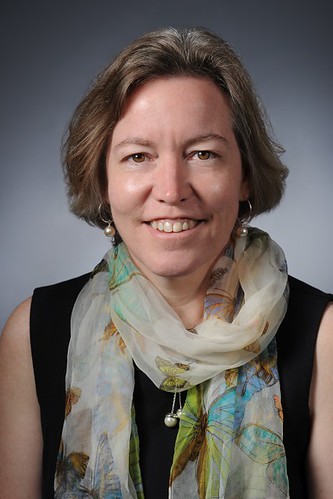
Every month, USDA shares the story of a woman in agriculture who is leading the industry and helping other women succeed along the way. This month, we hear from Dr. Cathy Kling, a Charles F. Curtiss Distinguished Professor of Agriculture and Life Sciences and a professor of economics at Iowa State University. She has served as the director of the Center for Agricultural and Rural Development (CARD) since July 2013. She received a bachelor's degree in business and economics from the University of Iowa and a doctorate in economics from the University of Maryland. In 2015, she became the first female ISU faculty member named to the National Academy of Sciences. In her work at CARD, Kling is undertaking research to examine how agricultural practices affect water quality, wildlife, soil carbon content, and greenhouse gases.
How did you first become interested in studying economics? What drove you to explore agriculture in particular?
I took an undergraduate economics class as a sophomore in college. Within a few weeks I had changed my major to economics and by the end of the semester I had decided to go to graduate school to study more about this amazing field. I didn't begin my work in agricultural economics for many years, and my interest in agriculture stem largely from my primary interest in environmental issues. I consider myself an environmental economist with strong interest in agricultural issues related to the environment.
Climate change poses many threats, especially to food security and agriculture-based economies globally. What can we do to adapt to and mitigate these changes? Are there special considerations for those in agriculture?
Climate change does pose a wide range of threats, many of which we probably are not fully anticipating at this stage. Those working in agriculture—and especially those with interests in agroecosystems and environmental areas related to agriculture—have been closely attuned to weather variability and how it affects their daily, monthly, and seasonal operations. Somewhat ironically, this probably gives them an upper hand in understanding the need to be agile and responsive to changes. But yes, there is no question that agriculture is likely to be one of the highest impacted sectors in the economy both in the U.S. and worldwide.
What is a typical day like for you?
When I am not traveling, my typical day revolves around meetings with graduate students and staff in the center that I direct. I spend a lot of time writing email, talking about research ideas, editing papers and correspondence, and attending (perhaps too many) meetings.
What is your favorite part about your job?
I get to work with an amazing array of people from around the world and close to home. I particularly enjoyed getting to know graduate students who have come from all corners of the globe to study environmental and cultural issues in the United States. Once they complete their degrees, they go on to teach, produce research, and extend knowledge back to those many reaches. It's a real treat.
What advice do you have for women who want to get involved in agricultural academia?
Go for it! I love my job, I'm very fortunate to have had the chance to do this job, and I am enthusiastic in recommending to others to pursue this career trajectory.
